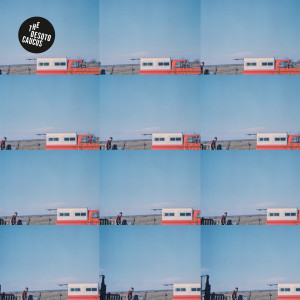 The DeSoto Caucus is a Danish band with roots in the desert of southern Arizona. How’s that, you say? The band’s members spend much of their time as musical collaborators of Tucson’s Howe Gelb, mostly in his longtime band Giant Sand, but also in various combinations on some of his solo recording projects or backing him when he tours solo. But sometimes when Gelb is elsewhere – whether touring with a Canadian gospel choir or recording with a Spanish flamenco ensemble – these gentlemen make their own kind of music. They’ve been the backing band for folks like Maggie Bjorklund, Lambchop’s Kurt Wagner, Isobel Campbell and Mark Lanegan, Scout Niblett and others, and on their own in the studio.
The DeSoto Caucus is a Danish band with roots in the desert of southern Arizona. How’s that, you say? The band’s members spend much of their time as musical collaborators of Tucson’s Howe Gelb, mostly in his longtime band Giant Sand, but also in various combinations on some of his solo recording projects or backing him when he tours solo. But sometimes when Gelb is elsewhere – whether touring with a Canadian gospel choir or recording with a Spanish flamenco ensemble – these gentlemen make their own kind of music. They’ve been the backing band for folks like Maggie Bjorklund, Lambchop’s Kurt Wagner, Isobel Campbell and Mark Lanegan, Scout Niblett and others, and on their own in the studio.
This self-titled disc from 2014 is their third. The DeSoto Caucus started out a few years ago as a trio of Anders Pedersen, Thøger T. Lund and Peter Dombernowsky. By now they’ve added Nikolas Heyman and Henrik Poulson to the mix. They all play various instruments and do some singing, although Pedersen sings most of the lead vocals and plays most of the lead guitar.
If you’ve listened to much Giant Sand you’ll pick up the DeSotos’ pedigree in the first couple of measures of the first track, “Nail In The Wall.” There is, shall we say, a certain sonic resemblance to Giant Sand. Pedersen, who takes lead vocals, even has a similar range to Gelb’s and a certain dryness to his delivery. But this isn’t a Giant Sand project, in spite of those sonic similarities. For one, the songs are a little more predictably linear than most of Gelb’s, although this band retains the loose groove that it brings to the Tucsonian’s projects. By the time you catch up to the second track, called “Skills Of Warfare,” with its burbling synth and the driving funky beat behind the noirish twang, the three-part harmonies, and Pedersen’s splendid, bluesy, minimalist electric guitar break on the bridge, your ears will know for sure that it’s The DeSoto Caucus and nobody else.
What’re these songs about? That video for “Skills of Warfare” doesn’t enlighten much. Lyrically they’re elusive. The words are clear but they don’t tell a straightforward story, which is in keeping with the mysterious atmosphere of the sounds. Wide open spaces are the tale told by the sounds, and wide spaces between people and their desires, between hopes and their realization, are the stories sketched by the words. “Words are strained / we’re ships in a wasteland” as it says in one couplet near the end of the song “Wasteland.”
All comparisons to their other band go out the window on the catchy slice of ’60s style psych-pop called “Just The Other Day.” It opens with a brief chord from Heyman on a Farfisa or some other cheesy organ and then kicks into a Shondells-type rocker about a star-crossed couple: “It seems like just the other day / half the city washed away / and you said us too, you’ll stay, you’re tired of running / seems like just the other day,” goes the first verse. “Lighthouse” finds Heyman playing what sounds like a circus calliope on a song that could be a lost INXS track complete with three-part “oooohhh-oooohhh” harmony vocals. And the final track “Don’t Fear” flat-out rocks with loud distorted electric guitars over a bluesy progression.
This is a brief album, 10 songs in just a little over a half-hour. All the better to put it back at the beginning and start over, to give it another chance to work its magic and you another chance to delve into the mystery of the poetry.
(Glitterhouse, 2014)
